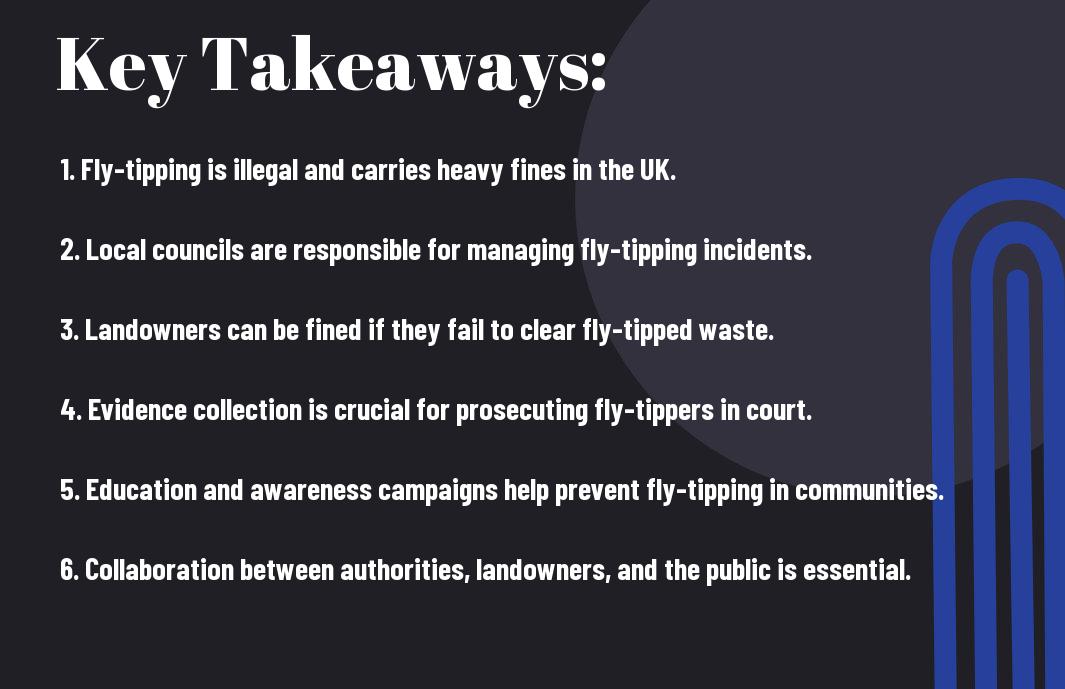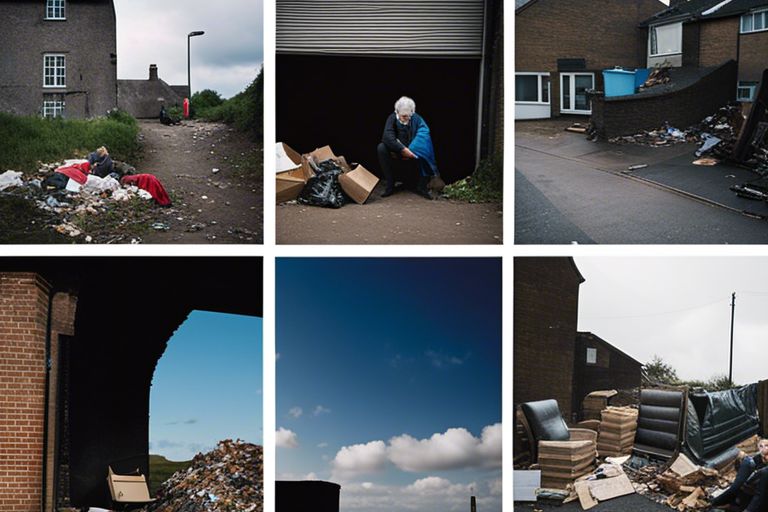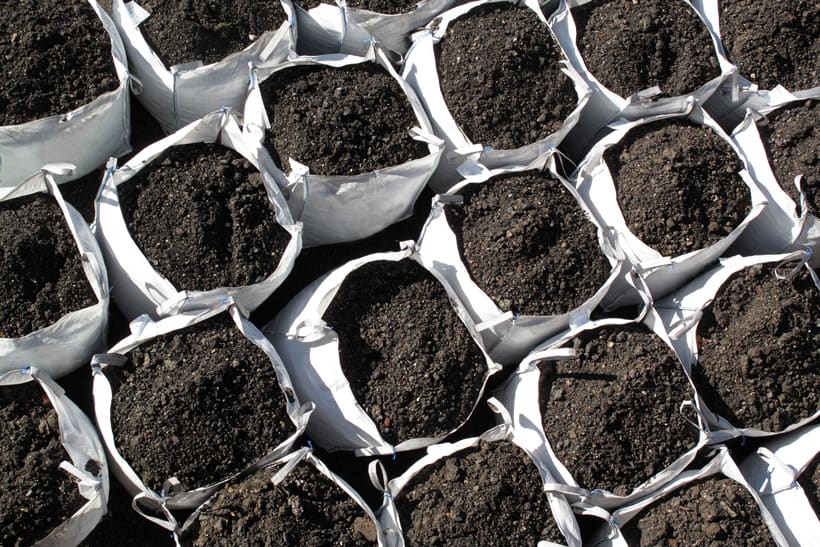Observe fly-tipping, the illegal disposal of waste, has become a significant problem in the UK. The Environmental Protection Act 1990 and the Clean Neighbourhoods and Environment Act 2005 form the backbone of fly-tipping legislation, providing local authorities with the power to investigate and prosecute offenders. Fly-tipping not only poses serious environmental and public health risks, but it also costs local councils and taxpayers millions of pounds annually to clean up. Understanding the complexities of fly-tipping laws in the UK is crucial, as individuals and businesses found guilty can face hefty fines and imprisonment. This blog post aims to provide a comprehensive guide to navigating through the fly-tipping laws in the UK, including the key legislation, penalties, reporting procedures, and preventative measures to combat this illicit activity. By raising awareness and promoting compliance with the law, we can work towards creating a cleaner and safer environment for everyone in the UK.
Key Takeaways:
- Understanding the Laws: It is crucial to have a clear understanding of the fly-tipping laws in the UK, including what constitutes fly-tipping and the penalties involved.
- Reporting and Disposal: Knowing how to report fly-tipping incidents and safely dispose of waste can help in preventing and addressing fly-tipping in your area.
- Legal Responsibilities: Property owners and waste producers have legal responsibilities to ensure their waste is properly disposed of, and understanding these responsibilities is essential in avoiding potential legal consequences.

Overview of UK Fly-Tipping Laws
Fly-tipping is a serious environmental crime that has significant negative impacts on the environment, public health, and local communities. The UK has stringent laws in place to deter and penalise the illegal dumping of waste, and to hold those responsible to account.
Legal Framework and Penalties
The Environmental Protection Act 1990 is the primary legislative framework governing fly-tipping in the UK. It makes it an offence to dump waste illegally and imposes heavy fines and potential imprisonment on offenders. Local authorities and the Environment Agency have the power to investigate and prosecute fly-tipping offences, and can issue fixed penalty notices or take legal action against those found to be in breach of the law.
Authorities Responsible for Enforcement
Local authorities, the Environment Agency, and the police are the main enforcement authorities responsible for tackling fly-tipping in the UK. They have the authority to investigate reported incidents, collect evidence, and take appropriate action to ensure that offenders are held accountable for their actions. These enforcement bodies work closely with other organisations and the public to identify and address fly-tipping hotspots and prevent further occurrences.
It is crucial that individuals and businesses understand the seriousness of fly-tipping and the potential consequences of perpetrating such illegal acts. By working together with the enforcement authorities, we can create a cleaner and safer environment for everyone.
Reporting Procedures
How to Report Fly-Tipping
If you come across an instance of fly-tipping, it is essential to report it as soon as possible. You can report fly-tipping to your local council or the Environment Agency in England, or to the appropriate regulatory body in Scotland, Wales, and Northern Ireland. You can usually report online, by phone, or by email. When reporting, it is important to provide as much detail as possible, including the location of the fly-tipping, the type of waste dumped, and any potential hazards.
What Information to Provide
When reporting fly-tipping, it is crucial to provide detailed and accurate information to aid the investigation. This includes the exact location of the incident, the date and time it was discovered, and a description of the waste that has been dumped. If possible, it is also helpful to provide any photographic evidence that you may have captured. This information will assist the authorities in taking appropriate action against the offenders.
It is important to note that the identity of the individual reporting fly-tipping will be kept confidential, so you can report incidents without fear of reprisal. Your report can make a real difference in combating fly-tipping and preserving the environment for the community.
Prevention and Community Involvement
Strategies for Prevention
Fly-tipping can be significantly reduced through strategic prevention measures. This includes the implementation of surveillance systems in known hotspots, which can act as a deterrent for potential perpetrators. Furthermore, a focused approach on waste management and recycling initiatives can limit the opportunities for illegal dumping. Engaging the local community in regular clean-up activities and raising awareness about the consequences of fly-tipping also play a crucial role in prevention.
Role of Education and Local Communities
Empowering local communities with the knowledge and skills to address fly-tipping is essential in the fight against this illegal activity. Education programmes, workshops, and awareness campaigns can foster a sense of ownership and responsibility towards the environment. By involving residents and community groups in reporting incidents and monitoring suspicious activities, a collaborative effort can be established to tackle fly-tipping effectively.
Local authorities and environmental organisations can work together to provide resources and support for educational initiatives, creating a network of informed and engaged individuals who actively contribute to the prevention of fly-tipping.

Case Studies and Legal Precedents
When it comes to understanding fly-tipping laws in the UK, it’s crucial to look at real-life examples and legal precedents. Below are some case studies that shed light on the implications and consequences of fly-tipping:
- Case 1: In 2019, a business owner was fined £10,000 for illegally dumping waste in a residential area, resulting in environmental damage and public health hazards.
- Case 2: A construction company was charged £15,000 after fly-tipping construction debris near a protected wildlife area, causing habitat destruction and endangering local species.
- Case 3: Three individuals faced criminal charges and community service for depositing hazardous materials in a local river, posing a serious risk to the ecosystem and downstream communities.
For more detailed information on avoiding fly-tipping and waste fines, visit Avoiding fly-tipping and how to ensure you don’t get waste fines.
Notable Prosecutions
Several notable prosecutions have set legal precedents in fly-tipping cases, underscoring the severe penalties and consequences for violating waste disposal laws in the UK. These cases serve as a stark reminder of the enforcement of environmental regulations and the importance of accountable waste management.
Lessons Learned from Past Cases
Examining past cases provides valuable lessons for individuals and businesses to understand the expectations of responsible waste disposal. From these cases, it’s evident that ignorance of the law is not a valid excuse, and every entity must take proactive measures to adhere to waste management regulations.
These insights serve as a warning to those who may overlook their environmental obligations, highlighting the zero tolerance approach towards irresponsible waste disposal.

Conclusion: Navigating Through Fly-Tipping Laws in the UK
When it comes to tackling the issue of fly-tipping, it is important for individuals and businesses to be aware of the laws and regulations in place. The UK government has put in strict measures to combat this environmental menace, and it is crucial for everyone to understand their responsibilities in preventing and reporting fly-tipping incidents. By staying informed about the regulations, we can work together to protect our environment and communities from the harmful effects of fly-tipping. To learn more about the laws and regulations regarding fly-tipping in the UK, visit fly-tipping.
FAQ
Q: What is considered fly-tipping in the UK?
A: Fly-tipping is the illegal dumping of waste on land that does not have a license to accept it. This can include anything from household rubbish to construction waste.
Q: What are the penalties for fly-tipping in the UK?
A: Penalties for fly-tipping can include hefty fines, community service, and even imprisonment, particularly for repeat offenders or those who have caused significant environmental harm.
Q: How can I report fly-tipping in the UK?
A: You can report fly-tipping to your local council or the Environment Agency. It’s important to provide as much detail as possible, including the location, type of waste, and any potential suspects.
Q: What are the responsibilities of landowners in preventing fly-tipping?
A: Landowners have a legal obligation to take reasonable steps to prevent fly-tipping on their land. This can include the installation of CCTV, secure fencing, and regular monitoring of the area.
Q: Are there any exceptions to fly-tipping laws in the UK?
A: There are certain waste types that are exempt from fly-tipping laws, such as agricultural waste on agricultural land. However, it’s important to ensure compliance with regulations and obtain any necessary permits or licenses.







